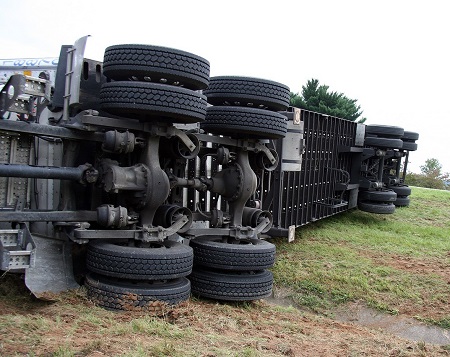How a Truck Accident Lawyer Helps Change Industry Practices Through Litigation
 Truck accident lawyers often do more than advocate for individual victims—they also serve as catalysts for systemic change within the commercial trucking industry. Through strategic litigation, these legal professionals uncover patterns of negligence, demand accountability from large transport corporations, and compel regulatory reforms that influence freight and logistics businesses’ operations. Their work highlights critical issues, including driver fatigue, unsafe maintenance protocols, and lack of adherence to federal safety regulations.
Truck accident lawyers often do more than advocate for individual victims—they also serve as catalysts for systemic change within the commercial trucking industry. Through strategic litigation, these legal professionals uncover patterns of negligence, demand accountability from large transport corporations, and compel regulatory reforms that influence freight and logistics businesses’ operations. Their work highlights critical issues, including driver fatigue, unsafe maintenance protocols, and lack of adherence to federal safety regulations.
By turning courtrooms into platforms for broader public safety and corporate responsibility discussions, these attorneys help shift the landscape toward more ethical and compliant business practices. We will explore how the impact of a truck accident lawyer extends beyond individual settlements, reaching deep into the operational frameworks of an entire industry.
The Legal Route to Safer Highways
Holding Trucking Companies Accountable for Negligent Practices
One of the primary ways a truck accident lawyer influences industry practices is by exposing and challenging negligent behavior among trucking companies. In many cases, litigation reveals that accidents were not merely the result of isolated driver errors but stemmed from systemic issues such as understaffing, unreasonable delivery deadlines, or poor vehicle maintenance. These lawsuits often require companies to turn over internal documents, logs, and compliance records, which can provide valuable insight into the broader safety culture, or lack thereof, within an organization.
Once patterns of negligence are brought into the public eye through court proceedings, companies are often forced to reassess and update their operational standards to avoid future liability. The ripple effect is substantial, as other logistics firms take note of costly judgments and adapt their policies to mitigate similar risks. In this way, litigation does more than secure compensation; it acts as a lever to drive industry-wide improvements in safety and accountability.
Uncovering Violations of Federal Motor Carrier Safety Regulations
Truck accident litigation frequently brings to light violations of the Federal Motor Carrier Safety Administration (FMCSA) regulations, which govern nearly every aspect of commercial trucking—from driver rest periods to weight limits and vehicle inspection routines. Truck accident lawyers use these regulations as a benchmark to evaluate whether a company or driver was compliant at the time of the crash. When violations are uncovered, the legal case can lead to significant penalties and mandatory changes in operations.
Additionally, these lawsuits often result in data being made publicly available, which regulatory bodies and safety advocates can use to push for stricter enforcement or updated legislation. Over time, the cumulative effect of such legal actions has contributed to better training programs, clearer compliance protocols, and more stringent oversight mechanisms across the industry. Truck accident attorneys help transform regulations into living standards that genuinely protect the public by using the courtroom to highlight gaps between policy and practice.
Encouraging Investment in Technology and Safety Innovations
As truck accident lawyers win significant cases involving outdated safety practices or avoidable collisions, companies are increasingly motivated to invest in advanced technologies to mitigate future risks. These technologies include collision avoidance systems, electronic logging devices (ELDs), dash cams, and fatigue monitoring tools. The pressure to adopt such tools often stems from legal settlements or jury verdicts highlighting how a lack of innovation contributed to an accident.
Moreover, legal arguments made in court help establish a de facto industry standard, where the absence of specific safety measures becomes indefensible in the event of a crash. This compels companies to follow the law and exceed it, adopting cutting-edge solutions that make their fleets safer and more efficient. Truck accident lawyers play an indirect but pivotal role in accelerating the integration of safety-focused technologies that protect truck drivers and everyone they share the road with.
Strengthening Whistleblower Protections Within the Industry
Litigation stemming from truck accidents has also highlighted the importance of protecting industry workers who speak out about unsafe conditions. In many high-profile cases, whistleblowers have played a key role by providing evidence of routine regulatory violations or unsafe work expectations imposed by management. Truck accident lawyers often work with these individuals to ensure their voices are heard and legally protected against retaliation. The visibility of these cases helps foster a culture where safety concerns are more likely to be reported and addressed rather than ignored.
Over time, this leads to stronger internal policies around reporting violations and can even result in legislative updates that expand worker protections. By elevating the stories of those within the trucking industry who risk their jobs to advocate for safer conditions, truck accident lawyers contribute to a more transparent and responsible industry environment that benefits workers and the public alike.
The work of a truck accident lawyer does not end with a successful case resolution—it often marks the beginning of industry-wide change. Through litigation, these legal professionals reveal unsafe practices, enforce compliance with federal regulations, and encourage companies to adopt safer technologies and stronger internal policies. Their influence extends into legislative reform and cultural transformation, positioning them as powerful accountability agents in an industry that directly impacts public safety. By holding trucking companies to higher standards and ensuring that the voices of victims and whistleblowers are heard, they help drive lasting improvements in how the freight and logistics sector operates.